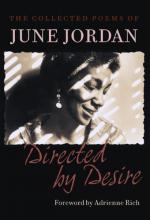|
This section contains 2,038 words (approx. 7 pages at 300 words per page) |

|
SOURCE: Baker, David. “Probable Reason, Possible Joy.” In Heresy and the Ideal: On Contemporary Poetry, pp. 199-204. Fayetteville: University of Arkansas Press, 2000.
In the following excerpt, Baker explains Jordan's motivation for ignoring Western standards of poetry to create an immediate, direct voice of political activism.
Occasionally I feel about Diane di Prima's poems the way I do about June Jordan's—that she writes poems as if poetry were sometimes rather far down on her list of interests. That is both compliment and complaint. Jordan is obviously devoted to the poetics of politics and judgment; she's a poetry activist. Her aesthetic includes not only the casual or democratic sensibilities of free verse but also the bald, repetitive, encantatory powers of oratory. Hers is a persistently spoken poetry, whose closest contact with song is the chant and, occasionally, the heavily stressed, feigned naivety of the blues, as in “Winter Honey...
|
This section contains 2,038 words (approx. 7 pages at 300 words per page) |

|


